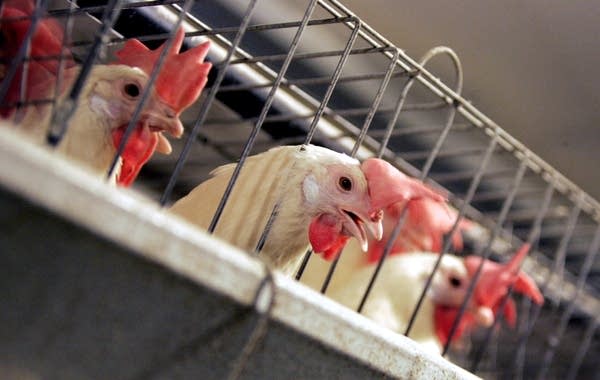Latest farm bill roadblock? It's about the eggs
Go Deeper.
Create an account or log in to save stories.
Like this?
Thanks for liking this story! We have added it to a list of your favorite stories.

A dispute over a 2010 California law concerning the treatment of egg-laying chickens looks like it may add to the complications for congressional negotiators trying to reach agreement on a new five-year farm bill this week.
The law has its origins in a 2008 ballot initiative in California pushed by animal rights groups that mandated that all eggs produced in California must come from hens who have enough space to spread their wings in their coops, far more space than most commercial egg operations provide. Two years later, lawmakers in the Golden State passed a law requiring out of state producers to comply with those regulations if they wished to sell in California.
The California law hasn't sat well with producers in the Midwest, where most of the nation's eggs are produced. That includes Minnesota, the eighth-largest producer of eggs in the country.
In the House, lawmakers added language to their farm bill that would prohibit states from enforcing standards that affect producers in other states. It's not in the Senate version of the farm bill. In a first meeting between House members and senators to write a compromise bill, Iowa GOP Rep. Steve King was adamant that the standards language should stay.
Turn Up Your Support
MPR News helps you turn down the noise and build shared understanding. Turn up your support for this public resource and keep trusted journalism accessible to all.
"Bottom line of it is that no state should be allowed to regulate the production in other states," said King, who wrote the language. "Any state, including California, is free to regulate, even over-regulate their producers, but not the other 49 states."
But King's amendment is dividing members more by region than by party.
"States have the rights to develop their own ag laws," said California Republican Rep. Jeff Denham, who deployed a traditional conservative states' rights argument to argue against King's amendment.
The Humane Society and other animal rights groups say King's amendment goes too far, especially because it would apply to all agricultural products and not just eggs.
"We think in effect it will nullify state laws that address mistreatment of farm animals," said Howard Goldman, the group's Minnesota state director.
Goldman doesn't expect Americans to give up eggs or bacon. We're not saying there should be no animal slaughter. We're saying animals should be raised humanely and slaughtered humanely."
The animal livestock industry has rallied behind Congressman King's amendment and is actively lobbying the 41 members of the House and Senate conference committee to get the measure in the final bill.
"The King Amendment allows our farmers to produce their eggs and to market them into other states based on the way we produce, the production practices we have," said Steve Olson, the executive director of the Chicken and Egg Association of Minnesota.
Producers worry their production methods could also be regulated more tightly by legislatures in other states, said Roger McEowen, law professor at Iowa State University.
"It could be free-range eggs today, free-range pork tomorrow, free-range beef the next day," he said, "whatever the case is."
McEowen argues that California's law is on shaky constitutional ground. The Commerce Clause of the Constitution prohibits states from setting up barriers to interstate commerce.
"For states to do this on their own, unless they've got some kind of legitimate reason to do so to protect the health and welfare of the residents, they can't do it," said McEowen.
Drake University law professor Neal Hamilton isn't so sure. He says the question is whether laws such as California's are designed to favor locals over those from out of state.
"There was no discriminatory intent to try to favor local farmers at the expense of people in other states," Hamilton said.
The Humane Society is spending $100,000 on ads to influence the members of the conference committee, including the three Minnesota Democrats on it, Sen. Amy Klobuchar and Rep. Collin Peterson and Rep. Tim Walz.
Peterson and Walz backed the amendment in committee, where it passed by a voice vote, which typically indicates near-unanimous agreement.
Walz says the pork producers in his district treat their animals humanely and he's concerned laws such as California's are being pushed to drive meat producers out of business.
"If these people's desire is to not have people eat pork or whatever it is then they can just state that and we'll not come to an agreement," he said.
But Senate Democrats, including Klobuchar, oppose the measure to rein in the California law and say they'll work to keep it out any final farm bill agreement.



